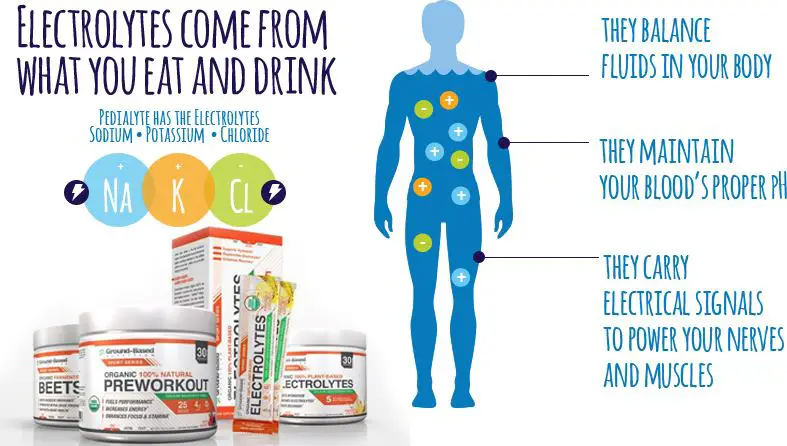Last Updated on 1 year by Francis
Electrolytes are vital to maintaining optimal health and performance. They play a key role in regulating the body’s fluid levels, controlling nerve and muscle function, and helping to create energy from food. But what exactly are electrolytes and why are they so important? In this article, we will discuss what electrolytes do for your body and the importance of maintaining the right balance in your body.

Contents
What Are Electrolytes and What Role Do They Play in The Human Body?
Electrolytes are minerals that are found naturally in the body and are essential for bodily functions like muscle contraction, nerve impulse transmission, and blood pressure regulation. They are also important for maintaining hydration and acid-base balance in the body. Electrolytes are composed of sodium, potassium, chloride, calcium, magnesium, phosphate, and bicarbonate. These minerals are found in the body in small amounts, and any imbalance can cause health problems.
The body needs electrolytes to function properly, and they are found in food, water, and supplements. The majority of electrolytes come from dietary sources. Foods like bananas, potatoes, spinach, legumes, and dairy products are rich in electrolytes. Water is also an important source of electrolytes, and the body uses electrolytes to absorb and retain water.
When electrolyte levels are off, serious health problems can occur. Low electrolyte levels can cause dehydration, fatigue, headaches, muscle cramps, and nausea. Too much electrolyte can lead to seizures, confusion, and cardiac arrest. That’s why it’s important to maintain a healthy balance of electrolytes in the body.
What are the Benefits of Electrolytes?
Electrolytes help the body maintain a healthy balance of water, minerals, and other substances. They also help to regulate the body’s pH levels. Electrolytes also play a role in nerve conduction, muscle contraction, and overall metabolism.
Electrolytes help to keep us hydrated by helping to absorb and retain water in the body. This is especially important during exercise and in hot climates, where the body can lose electrolytes quickly through sweat. Electrolytes are also important for regulating blood pressure, which helps to keep the heart healthy.
Finally, electrolytes help to maintain the body’s acid-base balance. This is important for overall health, as an imbalance can lead to serious health problems.
How to Get Enough Electrolytes
The best way to get enough electrolytes is to eat a balanced diet that includes fruits, vegetables, dairy products, and whole grains. Foods rich in electrolytes include bananas, potatoes, spinach, legumes, and dairy products.
Drinking plenty of water is also important for staying hydrated and maintaining electrolyte balance. It’s recommended to drink half your body weight in ounces of water every day. You can also take electrolyte supplements, which are available in pill or powder form.
Are There Any Side Effects of Taking Too Many Electrolytes?
Taking too many electrolytes can lead to health problems like nausea and vomiting, abdominal pain, diarrhea, and headaches. It can also cause an electrolyte imbalance, which can lead to seizures, confusion, and cardiac arrest.
For this reason, it’s important to only take electrolyte supplements if recommended by your healthcare provider. It’s also important to drink plenty of water when taking electrolyte supplements, as this can help to prevent dehydration.
Electrolytes and Exercise
Electrolytes play an important role in exercise and physical activity. During exercise, the body can lose electrolytes through sweat, which can lead to dehydration and fatigue. For this reason, it’s important to replace electrolytes lost through sweat during and after exercise.
The best way to do this is to drink plenty of water and eat foods rich in electrolytes, like bananas, potatoes, spinach, legumes, and dairy products. It’s also a good idea to take electrolyte supplements before, during, and after exercise to replenish lost electrolytes.
Conclusion
Electrolytes are essential minerals that play an important role in the body’s overall health. They are found naturally in the body and in foods like bananas, potatoes, spinach, legumes, and dairy products. They help to maintain hydration and acid-base balance, regulate blood pressure, and promote nerve conduction and muscle contraction. It’s important to maintain a healthy balance of electrolytes in the body and to replace electrolytes lost through sweat during exercise.
Related Faq
Q1. What are electrolytes?
A1. Electrolytes are electrically charged minerals found in the body, such as sodium, potassium, chloride, calcium, and magnesium. These ions are important for maintaining proper fluid balance and for controlling the electrical activity of muscles and nerves. Electrolytes are essential for a healthy body and for many bodily functions, such as muscle contraction, nerve impulse transmission, and maintaining a normal blood pH.
Q2. How are electrolytes released into the body?
A2. Electrolytes are released into the body through the food and fluids that we consume. They can also be released through sweat and urine. When we consume foods and drinks that contain electrolytes, our body absorbs them and releases them into the bloodstream. They are then circulated throughout the body to be used in various processes.
Q3. What are the benefits of electrolytes?
A3. Electrolytes are essential for maintaining the body’s fluid balance, as well as for controlling the electrical activity of muscles and nerves. They help to regulate blood pressure, support healthy muscle function, and promote regular heart rhythms. Electrolytes are also necessary for proper hydration and for maintaining energy levels.
Q4. What happens when electrolyte levels are too low?
A4. When electrolyte levels are too low, the body can experience a range of symptoms, such as headaches, fatigue, dizziness, and cramps. Low electrolytes can also lead to muscle weakness, dehydration, and an irregular heartbeat. It is important to ensure that your electrolyte levels remain balanced by consuming foods and drinks that are rich in electrolytes.
Q5. What happens when electrolyte levels are too high?
A5. When electrolyte levels are too high, it can cause an imbalance in the body and can lead to symptoms such as nausea, vomiting, diarrhea, and confusion. High electrolyte levels can also cause high blood pressure, irregular heartbeats, and even seizures. It is important to maintain healthy electrolyte levels by eating a balanced diet and drinking plenty of fluids.
Q6. How can you maintain healthy electrolyte levels?
A6. To maintain healthy electrolyte levels, it is important to eat a balanced diet that includes foods that are rich in electrolytes, such as bananas, oranges, and yogurt. Additionally, drinking plenty of fluids throughout the day is important for keeping electrolyte levels balanced. It is also important to limit your intake of processed and sugary foods, as these can cause electrolyte imbalances.
What Do Electrolytes Actually Do?
In conclusion, electrolytes are essential for the optimal functioning of your body. They help to regulate fluid balance, facilitate nerve, muscle and heart functioning, and aid in nutrient absorption and waste disposal. Without electrolytes, your body would be unable to perform its many vital functions and you wouldn’t be able to stay healthy and strong. That’s why it’s important to maintain your electrolyte levels through the foods you eat and the fluids you drink.


.jpg)
.jpg)





